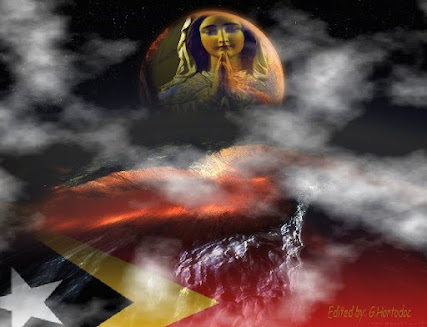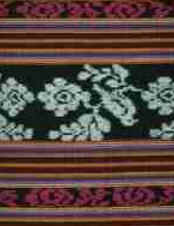The country faces great challenges in continuing the rebuilding of infrastructure and the strengthening of the infant civil administration. One promising long-term project is the joint development with Australia of petroleum and natural gas resources in the south-eastern waters off Timor, a location which became known as the Timor gap following the signing by Australia and Indonesia of the 'Timor Gap Treaty' when East Timor was still under Indonesian occupation.
East Timor inherited no permanent maritime boundaries when it attained independence, and the Government of East Timor is seeking to negotiate a boundary with Australia halfway between it and Australia. As at May 2004, the Government of Australia wanted to establish the boundary at the end of the Australian continental shelf. Normally a maritime dispute such as this could be referred to the International Court of Justice or the International Tribunal for the Law of the Sea for an impartial decision. However Australia withdrew from these organisations when it realised that East Timor might invoke these dispute resolution mechanisms.
Many advocacy groups claimed that Australia deliberately obstructed negotiations because the existing arrangement benefited Australia financially. On July 7, 2005, an agreement was finally reached under which both countries would set aside the dispute over the maritime boundary, and East Timor would receive A$13 billion (US$9.65 billion) in revenue.
Currently three foreign banks have a branch in Dili: ANZ Bank, Banco Nacional Ultramarino, and Bank Mandiri.
East Timor has the lowest per capita income in the world (USD 400 per annum) according to the CIA World Factbook, 2005.
Update - December 3, 2005
Australia and East Timor officials signed a billion-dollar gas and oil accord, which is necessary because of a current maritime border dispute between the countries, which covers a major oil field. Although the accord has to be ratified by East Timor's parliament which is ruled by Fretilin with 55 seats the biggest block in parliament, but all the smaller parties are said to be working together to veto the deal.
Australia and East Timor officials signed a billion-dollar gas and oil accord, which is necessary because of a current maritime border dispute between the countries, which covers a major oil field. Although the accord has to be ratified by East Timor's parliament which is ruled by Fretilin with 55 seats the biggest block in parliament, but all the smaller parties are said to be working together to veto the deal.
In 1975, Portugal abandoned East Timor and the people declared self-independence only to be invaded by Indonesia with out any intervention from Australia or the United States. Indonesia then agreed on no formal maritime boards but on a joint exploitation zone splitting profits 50/50. Indonesian rule in East Timor was marked by extreme violence and brutality and following a UN-sponsored agreement between Indonesia, Portugal and the US, East Timor held a referendum and gained independence, but violent Indonesian sponsored militia took hold. A peacekeeping force (INTERFET, led by Australia) then intervened putting a stop to the violence. The exploitation zone splitting profits was then changed to 60% in favour of Australia, but now a new deal has been proposed 90/10 in favour of Timor. In the mean time Australia has been accused of profiting by up to 2 billion dollars between the deals by activist groups like http://www.timorseajustice.org/ whose campaigning saw Woodside suspended oil pumping in the affected area.
Contemporary International law asserts that the area under dispute belongs to East Timor. Australia has withdrawn from the maritime division of the International Court of Justice, which could have settled this matter, instead opting to try to settle the matter without the court.
The previous deal has caused political infighting within East Timor about why such a smaller percentage was accepted.
Telecommunications
Following Indonesian withdrawal from East Timor in 1999, the telecommunications infrastructure was destroyed in the ensuing violence. A new country calling code (670) was allocated to East Timor, but international access often remains severely limited. A complicating factor is the fact that 670 was previously used by the Northern Marianas, with many carriers not aware that the code is now used by East Timor. (The Northern Marianas, now part of the North American Numbering Plan, use the code 1 and the area code 670.)
Following Indonesian withdrawal from East Timor in 1999, the telecommunications infrastructure was destroyed in the ensuing violence. A new country calling code (670) was allocated to East Timor, but international access often remains severely limited. A complicating factor is the fact that 670 was previously used by the Northern Marianas, with many carriers not aware that the code is now used by East Timor. (The Northern Marianas, now part of the North American Numbering Plan, use the code 1 and the area code 670.)
It is also often extremely expensive: for example, Telstra in Australia raised the cost of calls to East Timor to A$3.00 a minute from 97 cents in 2003. In the UK, BT's standard rate is £2 a minute.
Telstra expanded its cellular telephone signal into East Timor in 2000, and operated services until 2003, when Timor Telecom, 50.1% part-owned by Portugal Telecom, began operating fixed line and mobile telephone services. Until recently, the fixed line network was mainly confined to the capital Dili, although this has been expanded nationwide, to each district capital.
According to a press-release issued by Portugal Telecom, the total number of fixed phones (landline) are 2,100, mobile cellular are 25,000, 500 Dial-up access users and 30 broadband users (as of October 2004).
Portugal Telecom signed a 15-year contract in 2002 to invest US$ 29 million to rebuild and operate the phone system. The contract could be extended by 10 more years, totalling 25 years of monopoly. 2003 gross revenue totalled € 10.5 million.
All voice and data are carried out by Intelsat, using a direct satellite link with one hop to their downlink in Portugal.
Telephones - main lines in use:
2,100 (as per Timor Telecom press-release from Oct 2004)
Telephones - main lines in use:
2,100 (as per Timor Telecom press-release from Oct 2004)
Telephones - mobile cellular:
25,000 (as per Timor Telecom press-release from Oct 2004)
25,000 (as per Timor Telecom press-release from Oct 2004)
Radio broadcast stations:
AM NA, FM NA, shortwave NA
The main station is Radio Timor Leste, broadcasting in Tetum, Portuguese and Indonesian. Other radio stations include Radio Kmanek, and Radio Falintil, and Radio Renascença, while there are also FM retransmissions of RDP Internacional from Portugal and Radio Australia.
AM NA, FM NA, shortwave NA
The main station is Radio Timor Leste, broadcasting in Tetum, Portuguese and Indonesian. Other radio stations include Radio Kmanek, and Radio Falintil, and Radio Renascença, while there are also FM retransmissions of RDP Internacional from Portugal and Radio Australia.
Television broadcast stations:
1 Televisão Timor Leste or Televizaun Timor Lorosae - broadcasts local programming, as well as retransmissions of RTP Portugal, ABC Asia Pacific from Australia and BBC World from the UK. The TV signal is confined to Dili.
1 Televisão Timor Leste or Televizaun Timor Lorosae - broadcasts local programming, as well as retransmissions of RTP Portugal, ABC Asia Pacific from Australia and BBC World from the UK. The TV signal is confined to Dili.
Internet country code:
.TP is the Internet top-level domain code used for East Timor, based on its previous ISO 3166-1 code. However, the latter code was officially changed to TL when the country achieved its independence on May 20, 2002, and during the course of 2005, internet domains will change from '.tp' to '.tl'.
.TP is the Internet top-level domain code used for East Timor, based on its previous ISO 3166-1 code. However, the latter code was officially changed to TL when the country achieved its independence on May 20, 2002, and during the course of 2005, internet domains will change from '.tp' to '.tl'.
Internet Service Providers (ISPs):
Timor Telecom is an ISP itself along with one downstream provider, iNet. The latter only offers services in the capital, Dili. 2-way Satellite Internet is in theory available as the country falls within the Australia and Asia footprints of several satellites offering this service, however in practice licenses are not granted for use of non-Timor Telecom services. As such, internet services are restricted to locations with landline telephone or DSL infrastructure. WiMAX and GPRS internet access are not available.
Timor Telecom is an ISP itself along with one downstream provider, iNet. The latter only offers services in the capital, Dili. 2-way Satellite Internet is in theory available as the country falls within the Australia and Asia footprints of several satellites offering this service, however in practice licenses are not granted for use of non-Timor Telecom services. As such, internet services are restricted to locations with landline telephone or DSL infrastructure. WiMAX and GPRS internet access are not available.
Voice over IP
Timor Telecom has sought to block some Voice over IP services on its network such as Skype, and as a result some such services may not function.
Timor Telecom has sought to block some Voice over IP services on its network such as Skype, and as a result some such services may not function.
Internet users:
Dial-up: 2,100 (as per Timor Telecom press-release from Oct 2004)
Broadband: 50 (as per Timor Telecom press-release from Oct 2004)
Dial-up: 2,100 (as per Timor Telecom press-release from Oct 2004)
Broadband: 50 (as per Timor Telecom press-release from Oct 2004)
















